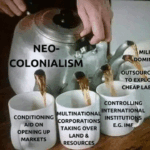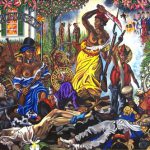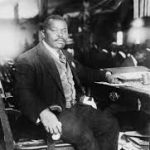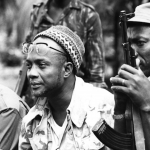by Jakob Drews
The global capitalist system is characterized by inequality through exploitation and dependency. These attributes were fostered by European colonization. Different parameters of dependency were institutionalized since the “independence” of the formally colonized. They characterize the structure of the international system. Some economies are profiting from the global capitalist system, some are doomed to depend on those who profit. This structure is binary and consists of the profiting centre and the exploited periphery. Both substructures were not “born” into their respective position. They were constructed. In this work, I am stressing the relationship between centre and periphery from a historical perspective. What constituted the centre in the centre and why is the periphery dependent on the centre?
Category: Uncategorized
Private Security Companies in the extractivist industry in Africa
by Konstantin von Kleist-Retzow
Private Security Companies perform services that are integral to maintaining extractivism. Consequently, this work claims that PSCs safeguard neocolonial extractivist practices in Africa and thereby reproduce and intensify global power imbalances in political, economic, and social terms…
The involvement of the Rockefeller Foundation in the Green Revolution: Structural Underdevelopment through Agricultural Reforms
by Madalena Kresimon
The aim of this paper is to illuminate the Rockefeller Foundation started Green Revolution, with its strength and weaknesses in the context of its political meaning. The questions I will be trying to answer are which political goals it served and in which patterns of neocolonialism, global injustice and structural underdevelopment can be observed in these agrarian reforms. Central will be Mexico, were the program started, and India, as it has often been focused on in the perception of the green revolution, also because of the political role it played…
Toppling Statues, Challenging Silences and Systemic Oppression: Protest as an opportunity to critically reflect History
by Camilla Salim Wagner
“…Starting from the activists’ demands and claims regarding the violent character of some statues, I discuss howstatues are connected to systemic oppression and the role silence plays in that dynamic, as well as the relevance of the act of taking those symbols down. Rather than directly engaging with the different arguments of opponents and defenders of specific statues, I approach the topic with a theoretically informed perspective, reflecting not only about the statues but how we, as Western societies, understand our History. Besides the meanings and implications of who is (and isn’t) represented by statues, I question the power relations shaping our narratives of history and their political and social implications…”
The Accumulation of Africa
by Mikael Lyngaas
In this essay I’ll examine capitalist accumulation and imperialism within an African colonial and post-colonial context.
Postcolonial Poetry Project: The mirage of national identity and the possible otherness
by Mauricio Jiménez Hernández and Mario Alberto Naranjo Ricoy
“This project has allowed us to politicize our personal inclination for poetry and, watered in the tradition of postcolonial poetry that we have been discovering in our research, to articulate a discourse and a shared approach in order to nourish and reinvent that tradition of rebellious words that accompany the struggles of humanity and peoples for a fairer world…”
Justice for Marcus Garvey
by Byungkun Kim
What I wish to do here is to revisit my own definition of Marcus Garvey’s exclusion and do justice to my own interaction with Garvey’s writing.
Neo-colonialism and Australian off-shore detention
by Jack Garton
The Australian government undertakes deliberate steps to dehumanise asylum seekers who come to Australia through a network of illegal concentration camps. The Australian federal government has consistently and knowingly disregarded legal norms and violated international law. Despite claims to the contrary, Australia wields profound and undue influence over Papua New Guinea and the Republic of Nauru, where these camps are located. Finally, the efforts of the Australian government in the years 2013-6 at ‘othering’ asylum seekers is an insidious form of dehumanisation. These policies, I shall argue, are not an aberration in European-Australian history, but rather a culmination of a profound and latent racism upon which the modern Australian state was founded upon.
Cabral speaks with Hegel – A Radio Podcast
by Beth Castaneda
Amílcar Cabral and Georg Hegel discuss various topics. Cabral taunts Hegel with his theory of master and bondsman and Hegel questions Cabral’s celebration of particularity. The debate follows this short introductory paper and it is an attempt to see how these men respond to some of the more sensitive parts of their theories.
What do the Belgian Congo and Vietnam have in common? – Tracing Systems of Capitalistic Oppression Through History
by Michael Angulo, Grant Chamness, Sean Gordon and Salome Tash
We will begin by starting with a case study of colonialism in the Belgian Congo. Colonialism is the explicit act of controlling a populace and its resources using colonies with the purpose of economic and political exploitation…These capitalist exploitations will prove to reverberate through time, and will manifest themselves again through neocolonialism and neoliberalism. To demonstrate the timeless and adaptive nature of these motivations, we will present a case study in which colonialism evolves into neocolonialism. Specifically, we will dissect how French colonialism naturally transformed into the neocolonialist, American occupation of Vietnam and ultimately the Vietnam War…In the last portion, we will outline the ways in which the exploitative practices of colonialism are now institutionalized at the international level, and how state actors have given significant power to transnational corporations. This system of corporate control, and the laissez-faire nature of world markets, is what enables powerful neoliberalist countries to continue the legacy of exploitation established by colonialism and neocolonialism. The actions of the International Monetary Fund, and World Bank, are instrumental in the institutionalization of capitalist driven exploitation.









